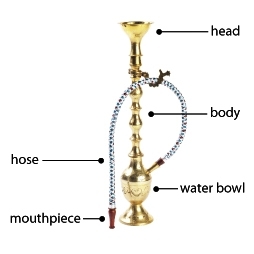Fewer teens today
smoke cigarettes than twenty years ago, but more are discovering new—and old—ways to use tobacco, including hookah, that are no less harmful to their health.
What is hookah?
Hookah (also called argilah, nargile, and hitboo) is the traditional name for waterpipes that were first used centuries ago in South Asia and the Middle East. A social and often shared form of tobacco use, hookah smoking has been gaining popularity among teens and young adults in the United States.
How does it work?
 Typically, groups of people sit around a hookah to smoke a shredded tobacco mixture known as
sisha, which is usually sweetened with fruity or candy flavors. The hookah's vase-like tower is heated near the top by lighting charcoal or bits of wood. Smoke and vapor from the combusted tobacco bubble through the hookah's water chamber and into one or more attached hoses from which users inhale before passing it to the next person in the group.
Typically, groups of people sit around a hookah to smoke a shredded tobacco mixture known as
sisha, which is usually sweetened with fruity or candy flavors. The hookah's vase-like tower is heated near the top by lighting charcoal or bits of wood. Smoke and vapor from the combusted tobacco bubble through the hookah's water chamber and into one or more attached hoses from which users inhale before passing it to the next person in the group.
Smoking hookah is not safe.
Because smoke from the tobacco passes through water, many people mistakenly believe hookahs are safer than cigarettes. However, studies show hookah does not effectively filter out harmful substances from the smoke. Hookah smokers may end up breathing in higher amounts of nicotine, metals, and toxic chemicals. Germs are also spread on the hoses' shared mouthpieces.
Here are some important facts about hookah:
One hookah session is the same as smoking 100 or more cigarettes. Hookah sessions can last half an hour or more, and the amount of smoke typically inhaled during this time is 100-200 times greater than the smoke inhaled from smoking one cigarette. Many of the same toxins that are inhaled in a cigarette are also breathed in through a hookah. Individuals may experience a rapid heart rate, increased blood pressure, or even irregular heartbeats. In the long term, it also puts you at increased risk for several types of tobacco-related cancers that strike the lungs, bladder and other organs, as well as respiratory diseases.
Poisonous and addictive chemicals are in hookah smoke. Carbon monoxide, arsenic, selenium, mercury, lead, benzene, and other chemicals in hookah smoke can reach dangerous levels during a single session. These chemicals have been shown to be especially dangerous for pregnant women and children.
Hookah leads to addiction. Research shows that over 95% of the nicotine is still available when using hookah and is not filtered out by the water chamber. This is more than enough to cause addiction. People who smoke hookah are much more likely to begin smoking cigarettes. One
study using Centers for Disease Control and Prevention (CDC) data found that young adult hookah smokers were more than twice as likely to try cigarettes than nonsmokers. Hookah also has been linked to increased alcohol and marijuana use.
Sharing more than smoke. Because hookahs come into direct contact with the mouth and are shared by multiple smokers, infectious diseases of the lungs, mouth, lips, and gums can be spread to other people during a session. Contagious diseases ranging from oral herpes to the flu might be passed along, and more dangerous illnesses such as tuberculosis and hepatitis have been linked to Hookah use.
Discuss the dangers of hookah.
According to the CDC, tobacco use remains our country's leading cause of preventable disease and death. Tobacco use almost always begins during youth and young adulthood. It's important to consider the health risks associated with hookah and other forms of tobacco smoking and to have a discussion with your family about it.
Additional Information & Resources: